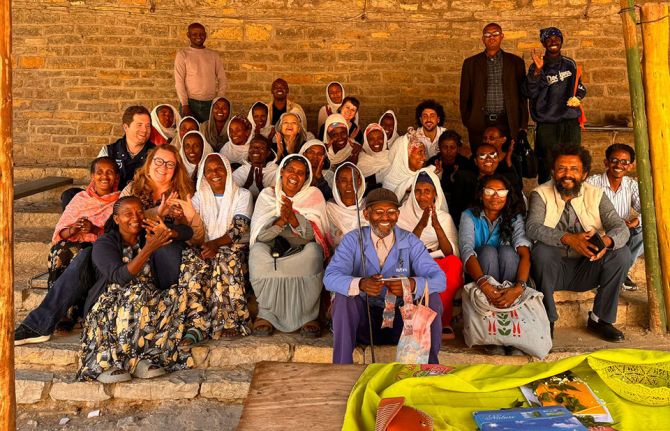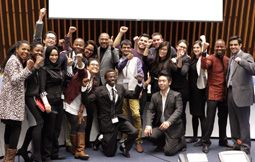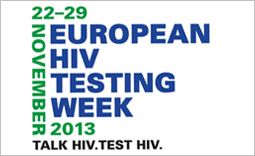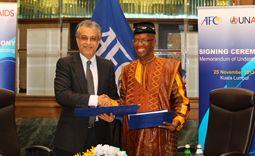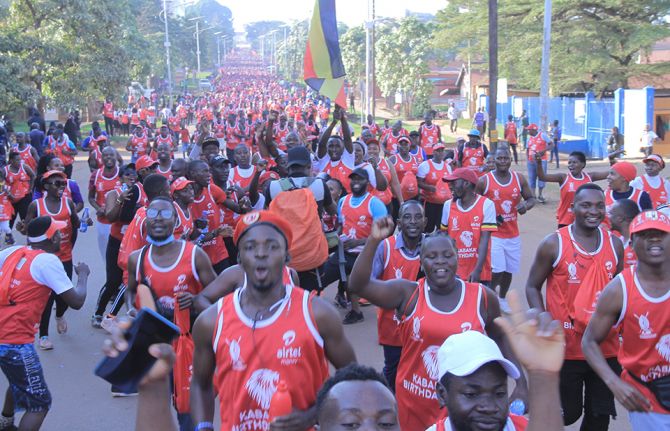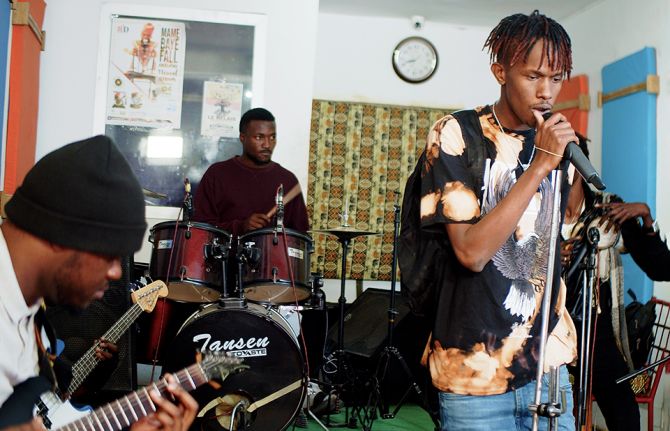
Feature Story
Danny Jordaan and UNAIDS Executive Director discuss global AIDS outreach around FIFA 2010 World Cup in South Africa
04 December 2009
04 December 2009 04 December 2009
UNAIDS Executive Director Mr Michel Sidibé (left) met with Mr Danny Jordaan, CEO of the 2010 FIFA World Cup South Africa Organising Committee, Cape Town 2 December 2009.
Credit: UNAIDS
The World Cup 2010 draw will take place later today in Cape Town South Africa at a ceremony with representatives of the teams from the 32 countries that have qualified for the tournament. The draw will decide who the teams will play in the tournament set to kick off on 11 June and will be eagerly watched by millions of fans around the world.
President Zuma’s new policies on HIV mark a fundamental break from the past, shattering years of official ambivalence, rallying citizens to take responsibility for learning their status, reducing their risk and seeking treatment.
Michel Sidibé, UNAIDS Executive Director
Earlier this week in Cape Town, UNAIDS Executive Director Michel Sidibé met with Mr Danny Jordaan, Chief Executive Officer of the 2010 FIFA World Cup South African Organising Committee to discuss support for global outreach on HIV by the South African government around the epic event which will take place next summer.
Mr Sidibé told Mr Jordaan that “President Zuma’s new policies on HIV mark a fundamental break from the past, shattering years of official ambivalence, rallying citizens to take responsibility for learning their status, reducing their risk and seeking treatment.”
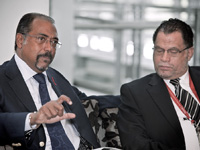
Michel Sidibé and Danny Jordaan, CEO of the 2010 FIFA World Cup South Africa Organising Committee, discussed support for global outreach on HIV around the 2010 World Cup which will take place in South Africa next summer.
Credit: UNAIDS
South African President Jacob Zuma has placed his country in the front line of worldwide efforts to turn the tide against the AIDS epidemic, and the World Cup will be a key opportunity to convey life-saving messages on prevention, achieving universal access, and overcoming stigma and discrimination.
It is about much more than 90 minutes of world-class football in each game. As the first developing country to host the event, with Brazil following in 2014, we must be engaged in the struggle on major issues facing Africa and developing countries worldwide.
Mr Danny Jordaan, Chief Executive Officer of the 2010 FIFA World Cup South Africa
Mr Jordaan highlighted the significance of the World Cup tournament to South Africa: “It is about much more than 90 minutes of world-class football in each game. As the first developing country to host the event, with Brazil following in 2014, we must be engaged in the struggle on major issues facing Africa and developing countries worldwide.”
He added that, “The first thing is the battle for minds to fight stigma and discrimination in strengthening the AIDS response.” Mr Jordaan cited the example of South African judge Edwin Cameron, a vocal campaigner for gay rights who was the first senior official in the country to state that he is living with HIV. At a recent banquet of the local organising committee, Justice Cameron spoke against stigmatization, saying, “I am the virus that you fear so much.”
The President of the South African Football Association (SAFA) Mr Kirsten Nematandani, and Chief Mwelo Nonkonyana, Vice President of SAFA also participated in the meeting.

(from left) Djibril Diallo, Senior Communication Advisor UNAIDS; Bunmi Makinwa, Regional Director, Africa, UNFPA; Michel Sidibé UNAIDS Executive Director; Danny Jordan, CEO of the FIFA Local Organising Committee South Africa; Kirsten Nematandani, President of the South African football Association (SAFA); Luis Loures, Director of the Executive Office UNAIDS; Chief Mwelo Nonkonyana, Vice President of the South African football Association (SAFA) Credit: UNAIDS
Mr Sidibé expressed thanks to Mr Jordaan for his strong commitment to AIDS advocacy and welcomed South African initiatives on AIDS related to the World Cup.
The Executive Director earlier met with South African Health Minister Dr Aaron Motsoaledi and Mr Kgalema Motlante, Deputy President of the Government of South Africa and their discussion included the government’s advocacy efforts around the World Cup. During his visit to Pretoria, the Executive Director conferred with United Nations Resident Coordinator Dr Agostino Zacharias concerning plans for activities by the UN system on HIV for the World Cup.
Danny Jordaan and UNAIDS Executive Director discu
Multimedia:
Feature stories:
President Zuma and UNAIDS Executive Director call for mass prevention movement at World AIDS Day commemoration in Pretoria (01 December 2009)
External links:
Related

Feature Story
UNHCR chief pledges to keep AIDS response a priority
03 December 2009
03 December 2009 03 December 2009
Rocking in Nepal: A band on stage at the World AIDS Day concert in Damak.
Credit: UNHCR
As the world marked World AIDS Day on Tuesday, UNHCR’s chief, António Guterres, revealed that the UN Refugee Agency had expanded its global HIV interventions.
Guterres, while reiterating his personal commitment to keeping AIDS a priority for UNHCR, also stressed that his agency would continue to advocate for the abolishment of laws discriminating against those with HIV.
In an annual message to staff, the High Commissioner noted: "We now have activities in more than 75 countries, and 75 percent of refugees have access to anti-retroviral therapy when it is available to surrounding host country nationals, whereas 63 percent have access to prevention of mother-to-child transmission programmes (PMTCT)."
We have 100 percent coverage for voluntary counselling and testing, PMTCT and anti-retroviral therapy for refugees.".
UN High Commissioner for Refugees, António Guterres (UNHCR)
He continued that in southern Africa, the epicentre of the AIDS epidemic, "We have 100 percent coverage for voluntary counselling and testing, PMTCT and anti-retroviral therapy for refugees." In 2005, UNHCR only had HIV programmes in Africa and Asia; it has since expanded these to the Americas and Eastern Europe.
Guterres said UNHCR's goal was to ensure that all people of concern to the agency had access to these essential services. "Furthermore, the HIV and AIDS response for internally displaced persons and for high risk groups among UNHCR's persons of concern needs strengthening," he said.
The High Commissioner also pledged to help staff members affected by HIV. "More needs to be done to combat stigma and to support those staff members who live with HIV. We are committed to reaching the 10 UN minimum standards on HIV in the workplace by 2011, so that every staff member has an active knowledge about HIV and AIDS prevention, treatment and related rights within the UN system," he said.
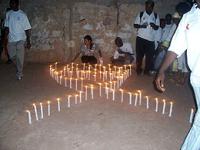
Refugees in Gambia commemorate World AIDS Day.
Credit: UNHCR
"World AIDS Day provides each of us with an opportunity to renew our resolve to fight the epidemic both in our personal and professional lives and I encourage us all to do exactly that," Guterres concluded.
UNHCR held a wide range of activities at Geneva headquarters and in field offices and camps for the forcibly displaced around the world. A banner of a large red ribbon, symbolizing AIDS awareness, was hanging from the façade of the headquarters building, where staff could pick up literature and educational material on HIV as well as purchase silk and cotton clothing items made by people living with HIV in Thailand.
Among overseas events held to mark World AIDS Day, was an awareness-raising concert for refugees and local communities in eastern Nepal. The event, held at a school in Damak with support from FC Barcelona, featured a wide range of music, including Nepali folk, raga, rock, funk, blues and jazz.
UNHCR chief pledges to keep AIDS response a prior
Cosponsors:
Feature stories:
UNHCR reflects on progress and remaining challenges on World AIDS Day (02 December 2009)
Addressing the HIV-related needs of “people on the move” (19 June 2009)
HIV in humanitarian crises: Opportunities and challenges (12 August 2009)
Publications:
Human rights for everyone (pdf, 1.89 Mb.)

Feature Story
International Labour Organization marks World AIDS Day
03 December 2009
03 December 2009 03 December 2009
ILO officials have gathered every year since 2006 to form a human red ribbon to commemorate World AIDS Day in ILO headquarters
Credit: ILO
About one hundred officials gathered to form a human red ribbon to commemorate and celebrate World AIDS Day at the International Labour Organization (ILO) headquarters in Geneva on 1 December.
This symbolic gathering was followed by ceremony moderated by Mrs Manuela Tomei, Director of the Condition of Work and Employment Programme. Mrs Maria Angelica Ducci, Executive Director, read a statement by the Director-General, Juan Somavia which highlighted the importance of enabling HIV-positive workers to remain in their jobs by eliminating stigma and discrimination. He further emphasized the need for a multi-dimensional approach with long-term commitment, creativity and diversity in order to prevent more infections.
The ILO gave a voice to people living with HIV. Mr Rodrigo Pascal from the UN System Positive Staff Group (UN Plus) presented a testimonial. He explained that UN Plus now counts 170 members, representing 28 UN entities in 43 countries. He underlined the right to work for people living with HIV: “We also have the right to keep our jobs and to be promoted according to our skills and performance.” He added that “where there is access to treatment we can live a regular life, the side effects of treatment are generally pretty manageable. We can face challenges as any other human being.”
in the absence of Dr Sophia Kisting, Director of the ILO Programme on HIV/AIDS and the world of work who is attending a special World AIDS Day Event in the context of the First African Decent Work Symposium on recovering from the Crisis Ouagadougou, Burkina Faso.

Jazz concert from the Namibian musician Jackson Wahengo and his band
Credit: ILO
A jazz concert from the Namibian musician Jackson Wahengo and his band concluded the celebration. Mr Wahengo performed his songs in Oshiwambo his native language. One such song was Takamifeni which means be careful is the message of a HIV positive father to his son.
Dr Sophia Kisting, Director of the ILO Programme on HIV/AIDS and the world of work was in attendance at a special World AIDS Day event in Ouagadougou, Burkina Faso during the First African Decent Work Symposium on recovering from the Crisis.
ILO officials have gathered every year since 2006 to form a human red ribbon to commemorate World AIDS Day. This year’s event marked the conclusion of the festivities of the 90th anniversary of the ILO, eight years after the creation of the ILO Programme on HIV/AIDS and the world of work in 2001.
International Labour Organization marks World AID
Cosponsors:
Statements:
Director-General of ILO, Mr. Juan Somavia, Message on the occasion of World AIDS Day, 1 December 2009 (pdf, 48 Kb.)
Related
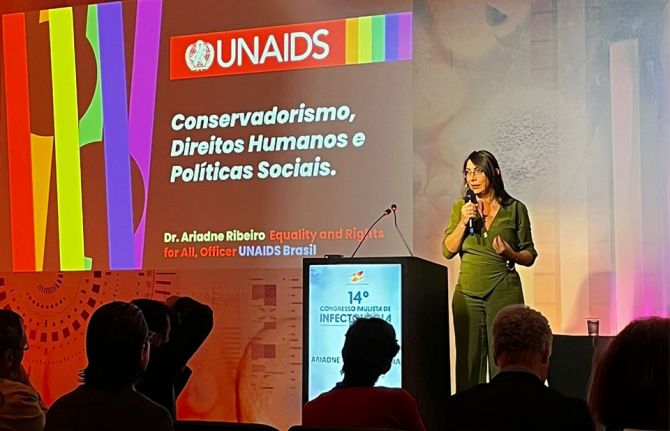 Upholding dignity for everyone: Ariadne Ribeiro Ferreira
Upholding dignity for everyone: Ariadne Ribeiro Ferreira

21 November 2024
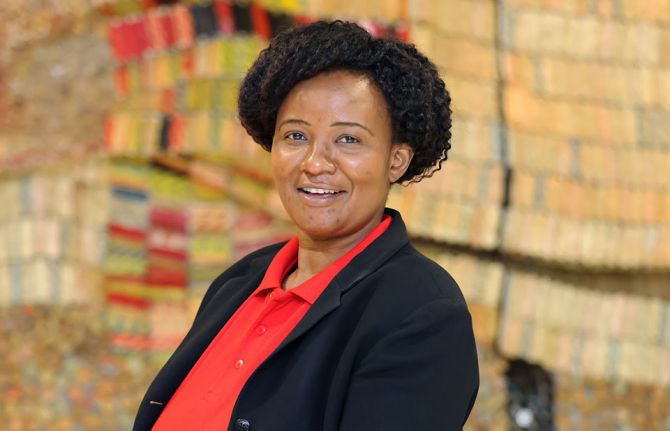 Evelyn Siula: A journey of strength and solidarity
Evelyn Siula: A journey of strength and solidarity
18 November 2024

Feature Story
“HIV cannot be managed in isolation”: Pacific Commission on AIDS
02 December 2009
02 December 2009 02 December 2009Honourable Misa Telefoni Retzlaff, Chairman of the Commission on AIDS in the Pacific presents a commemorative gift to UN Secretary-General Ban Ki-moon to mark the launch of the report “Turning the Tide: An OPEN strategy for a response to AIDS in the Pacific”. New York, 2 December 2009.
Credit: UNAIDS/B. Hamilton
An independent Commission on AIDS in the Pacific recommends that HIV cannot be managed in isolation; it should be considered in the overall development context of the region. This is one of several recommendations stemming from the report that was launched today by UN Secretary-General Ban Ki-moon at the United Nations in New York.
Titled Turning the Tide: An OPEN strategy for a response to AIDS in the Pacific, the report outlines the key challenges that are blocking the AIDS response in the Pacific and presents decisive steps countries in the region should take to protect their societies, cultures and economies from HIV.
In addition, the report states that a “one size fits all” response does not suit the diversity of Pacific nations and outdated legislation criminalizing homosexuality and commercial sex is a major impediment in the region.
Governments, civil society and people living with HIV must come together to scale up the AIDS movement that is informed by evidence and grounded in human rights.
Michel Sidibé, UNAIDS Executive Director
"Punitive laws are a significant barrier to effective HIV prevention and our response to AIDS," said United Nations Secretary-General Ban Ki-moon. "We must uphold the rights of all people living with HIV. In particular, countries in the region must repeal laws that fuel stigma and discrimination against men who have sex with men, sex workers and injecting drug users."
Commenting on the report’s release, UNAIDS Executive Director Michel Sidibé said the Pacific region has a unique opportunity to achieve universal access to HIV prevention, treatment care and support, “Governments, civil society and people living with HIV must come together to scale up the AIDS movement that is informed by evidence and grounded in human rights,” said Mr Sidibé. “The AIDS response must become a catalyst to achieve the Millennium Development Goals in the region.”
Comprising some of the world’s smallest, most isolated and least developed countries, the Pacific region spans a third of the world’s surface and accounts for just 0.14% of the world’s population—with a similar proportion of the global burden of HIV. However, for Pacific countries, even a small number of people living with HIV can translate into high incidence and prevalence rates.
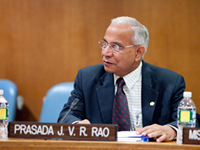 UNAIDS RST Director Prasada Rao addressed the launch of the report which was published by the Commission on AIDS in the Pacific. New York, 2 December 2009.
UNAIDS RST Director Prasada Rao addressed the launch of the report which was published by the Commission on AIDS in the Pacific. New York, 2 December 2009. Credit: UNAIDS/B. Hamilton
Pacific countries are often included in broad Asia-Pacific regional groupings where the magnitude of the problem in Asian countries overshadows the challenges and needs of smaller Pacific countries.
These realities about the regions led to the constitution of an independent Commission on AIDS in the Pacific in October 2007 to examine the current scale of the HIV epidemic in the region.
HIV Incidence
Countries in the Pacific are at various levels of achieving the Millennium Development Goals, but the report claims it is unlikely that any will meet all the health targets by 2015.
There have been 29,629 reported cases of people living with HIV in the Pacific, with 5,162 new HIV diagnoses reported in 2008.
Papua New Guinea makes up the largest share of cases, growing exponentially from 21% in 1984–1989 to over 99% in 2008. Reported cases in Papua New Guinea total 28,294 but UNAIDS estimates there are 54,000 people living with HIV. It is estimated that by 2012, Papua New Guinea will have a national prevalence rate of 5.07% and a total of 208,714 people will have been infected with HIV.
The predominant means of HIV transmission in the region is unprotected sex. The number of HIV-positive young people is steadily increasing and young women are infected earlier than young men. New Caledonia, French Polynesia and Guam have identified unprotected male-to-male sex and injecting drug use as key drivers of their epidemics.
The Pacific Response
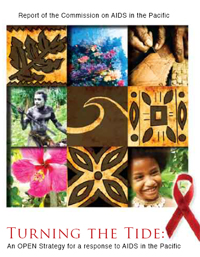 “Turning the Tide: An OPEN strategy for a response to AIDS in the Pacific”.
“Turning the Tide: An OPEN strategy for a response to AIDS in the Pacific”. Between 2001 and 2009, funding for HIV programmes in the region increased more than five-fold to US $77 million in 2008. The cost of implementing HIV programmes in the Pacific is high due to cultural and linguistic diversity, limited and expensive transport networks, and poor communications infrastructure.
Although the Commission commended Pacific leaders for acting early to support an AIDS response, it also noted that knowledge is still limited because of poor surveillance and data collection and analysis.
The Pacific AIDS response will benefit more by focusing on unprotected sex and other high-risk behaviours, rather than population groups, it noted.
As strong family and faith-based ties are central to life in the Pacific, any hope for success addressing the epidemic depends on integrating responses to HIV within these social structures. The report also recommends that greater involvement of people living with HIV in matters of policy making and programme delivery will strengthen the response.
“AIDS in the Pacific should not be seen as a burden which is diverting resources away from other priorities,” said the Honourable Misa Telefoni Retzlaff, Chairman of the Commission on AIDS in the Pacific, who launched the report with the Secretary-General. “AIDS is an opportunity for development and for addressing the inequalities, inequities and injustices in our societies.”
“HIV cannot be managed in isolation”: Pacific Com
Press centre:
Pacific faces expanding HIV threat
Pacific on brink of serious HIV epidemic
HIV risks spreading further in the Pacific unless countries scale up their AIDS response (2 December 2009)
Speeches:
Publications:
Turning the Tide: An open strategy for a response to AIDS in the Pacific (pdf)
25th PCB: Conference Room Paper: Second Independent Evaluation 2002-2008: Pacific Region - Summary Report (pdf, 451 Kb.)

Feature Story
World Bank on World AIDS Day: HIV as key development issue
01 December 2009
01 December 2009 01 December 2009To mark World AIDS Day this year the World Bank is hosting an event in Washington DC which brings together a wide range of international partners and high-level guests to explore key issues in the challenge to HIV. Entitled Keeping the promise, Investing in the future: Linking HIV/AIDS, food security and maternal and child health, the gathering will examine AIDS as a central development issue, forging critical links between the epidemic and broader development goals.
To watch live click here
The event brings together the "big three" in AIDS funding - USG/PEPFAR (Under-Secretary for State, Hon. Jack Lew , and Ambassador Eric Goosby who heads PEPFAR), the Global Fund (Michel Kazatchkine, Executive Director) and the World Bank (MD Ngozi Okonjo-Iweala, Debrework Zewdie, and Julian Schweitzer). There will be short talks by WB President Bob Zoellick, Hon Jack Lew, Beldina Atieno – an HIV positive school teacher from Kenya, and Dr Jean (Bill) Pape who will discuss groundbreaking new data from his work in Haiti (with Cornell University) on the link between nutrition and health outcomes for people with HIV. Then there will be a "Davos-style" conversation, moderated by Frank Sesno (former chief CNN correspondent, now Director, GWU School of Media and Public Affairs.).
It takes place this morning at World Bank headquarters in Washington from 9.00am to 10.45am local time and will be web cast live. The event includes the following speakers and panellists:
- The Honorable Jack Lew, U.S. Deputy Secretary of State
- Beldina Atieno, Teacher and mother living with HIV, Kenya
- Jean Pape, Director, GHESKIO, Haiti, and Professor of Medicine, Cornell University
- Michel Kazatchkine, Executive Director, Global Fund to Fight AIDS, TB and Malaria
- Ambassador Eric Goosby, US Global AIDS Coordinator
- Ngozi Okonjo-Iweala, Managing Director, World Bank
- Debrework Zewdie, Director, Global HIV/AIDS Program
- Robert Zoellick, President, World Bank Group (by video)
World Bank on World AIDS Day: HIV as key developm
Related

Feature Story
What does living with HIV mean to me?
01 December 2009
01 December 2009 01 December 2009
There are an estimated 33.4 million people around the world living with HIV. As we gather around the globe today World AIDS Day to collectively commemorate, celebrate and speak out against obstacles, it is important to not lose sight of the individuals behind the numbers and to remember the very real impact HIV has on people’s lives.
This is Raffaele’s story.
Since being diagnosed with HIV almost ten years ago, there is a question that people often ask me when hear that I am living with HIV. “How did you feel when you found out?”
Blur.
That is the only word that instantly comes to my mind. Walking like an automaton for days, until my first adult tears were shed outside a shop window display. What triggered it, I could not say, but this is my early, and only, recollection of my diagnosis. Standing still for hours, crying in the middle of the street.
I cannot deny it has been a difficult journey; one comes to terms with some hard-hitting realities, and I found them harder when they were closer to home.
I saw these as experiences I had to learn by….
Raffaele
Beforehand, stigma and discrimination were just abstract concepts for me, till the day I started experiencing them in my own skin.
Life-long friends started disappearing, withdrawing the very thing I needed most, support. The vacuum they created was difficult to understand, and the whole process distressing, affecting my already debilitating health. Nonetheless, I saw these as experiences I had to learn by.
There were so many challenges I had to face, and so many decisions to take. HIV medication and its difficult side effects were just some of them. If I think back to that time, to those sleepless nights, the constant nausea, and countless other ailments my body had to endure, it could have been easy to give up. Then again, if I think back to that time, I see all those positive elements that gave me strength and renewed energy to continue.
I consider myself lucky. Having access to ARV treatment has given me the possibility to lead a normal life, backed up by the support and love of my wonderful partner. My career as graphic designer has always been important to me, and in my early years of my diagnosis I was fortunate to work in an environment where I and other HIV positive colleagues were able to be truthful about our status. We could talk freely about the ups and downs of everyday life living with HIV without the necessity to constantly hide these facts.
These last ten years have been for me like a rollercoaster ride, with joyful long bouts and scary, dreadful moments.
I could see that I am, yet again, at the end of another cycle, but that energetic child in me is more than ready to get on the next ride.
For me World AIDS Day is not only a day to remember those who no longer are with us, but also to remind others of our daily fight against the virus, against stigma and discrimination, and hope that one day these will be just feeble memories of the past.
Raffaele lives in London.
What does living with HIV mean to me?
Feature stories:
United Kingdom rollout The People Living with HIV Stigma Index (30 November 2009)

Feature Story
Shining light on rights this World AIDS Day in New York
01 December 2009
01 December 2009 01 December 2009
To focus on the human rights of people living with HIV, United Nations Secretary-General Ban Ki-moon will be joined UNAIDS Goodwill Ambassador Naomi Watts, Kenneth Cole, chairman, board of trustees, amfAR, The Foundation for AIDS Research, New York City Speaker of the City Council Christine C. Quinn, and 13-year-old AIDS activist Keren Dunaway-Gonzalez in New York City.
They will gather at the Washington Square Park Memorial Arch where the floodlights illuminating the monument will be turned off at 6:15 to remember those lost to AIDS and will be turned back on by 6:20 to emphasize the need to shine the light on human rights for those living with HIV around the globe.
Floodlights on the Empire State Building, clearly visible through the arch, will also be turned off and turned back on at the same time. Other participating venues turning off their lights in New York City include all Broadway theaters, Madison Square Garden, Lincoln Center, the Chrysler Building, and the Brooklyn Bridge.
The New York event is part of global “Light for Rights Campaign” organized by amfAR, The Foundation for AIDS Research; UNAIDS; Broadway Cares/Equity Fights AIDS; and World AIDS Campaign.
amfAR and its partner organizations have created a special Light for Rights campaign web site (www.lightforrights.org) that provides descriptions of Light for Rights activities that can be organized in other locations, social networking ideas, and templates for campaigning.
World AIDS Day is an international day of celebration, remembrance and an opportunity for people around the globe to renew their commitment in the AIDS response. The theme for this year is "Universal Access and Human Rights".
Shining light on rights this World AIDS Day in Ne
Speeches:
World AIDS Day Statement from UN Secretary-General Ban Ki-moon
ar | cn | fr | es | ru
“Universal Access and Human Rights” Message from Michel Sidibé, Executive Director of UNAIDS, on the occasion of World AIDS Day, 1 December 2009
fr | es | ru
External links:
Light for rights
The Foundation for AIDS Research (amfAR)
World AIDS Campaign

Feature Story
President Zuma and UNAIDS Executive Director call for mass prevention movement at World AIDS Day commemoration in Pretoria
01 December 2009
01 December 2009 01 December 2009UNAIDS Executive Director Michel Sidibé together with President Jacob Zuma at the national commemoration in Pretoria
Credit: UNAIDS/Melanie Hamman
To mark World AIDS Day, UNAIDS Executive Director Mr Michel Sidibé joined President Jacob Zuma and South Africans in their national commemoration in Pretoria where he called for the forging of a mass prevention movement.
Mr Sidibé was in the company of the President of the Republic of South Africa Mr Jacob Zuma and Minster of Health Dr Aaron Motsoaledi at the Tshwane Events Centre in Pretoria for an event attended by thousands of participants. At the event, President Zuma made a commitment to take an HIV test, personifying the theme of the South African celebrations–I am Responsible.
Mr Sidibé, in his World AIDS Day address referred to South African President Mr Zuma’s landmark speech in October to the National Council of Provinces in Parliament. That speech, praised by UN Secretary-General Ban Ki-Moon, marked a fundamental break from the past outlining bold and ambitious goals to turn the tide on AIDS epidemic.
I am here today to stand in solidarity with your commitment and vision—you are giving hope to so many millions who have been waiting for South Africa to join the front line in the global response.
Michel Sidibé, UNAIDS Executive Director.
“I am here today to stand in solidarity with your commitment and vision—you are giving hope to so many millions who have been waiting for South Africa to join the front line in the global response,” said Mr Sidibé.
In South Africa an estimated 5.7 million were people living with HIV in 2007; the world’s largest population of people living with HIV. Sub-Saharan Africa remains the region most heavily affected by HIV worldwide, accounting for over two thirds of all people living with HIV and for nearly three quarters of AIDS-related deaths in 2008.
Our message is simple, we have to stop the spread of HIV. We must reduce the rate of new infections. Prevention is our most powerful weapon against the epidemic.
President Jacob Zuma of South Africa
“Our message is simple,” President Zuma said, “we have to stop the spread of HIV. We must reduce the rate of new infections. Prevention is our most powerful weapon against the epidemic.”
President Zuma announced the provision of HIV treatment to all children under one year of age if they test positive.
He also spoke of South Africa’s goal of universal voluntary HIV testing: “To take our response a step forward, we are launching a massive campaign to mobilise all South Africans to get tested for HIV. Every South African should know his or her HIV status.”
South Africa’s renewal of commitment for an evidence-informed AIDS response, calling its citizens to know their status, reduce risk and seek treatment, is pivotal to the success of the AIDS response regionally, on the African continent, and beyond.
(from left) H.E. Mr. Lennarth Hjelmåker, Sweden's special Ambassador on AIDS; UNAIDS Executive Director Michel Sidibé; Swedish Minister of International Development & Cooperation, Ms. Gunilla Carlsson; Pretoria, 1 December 2009.
Credit: Embassy of Sweden, Pretoria, South Africa
There is hope for universal access; in 2008, 44% of adults and children in the region in need of antiretroviral therapy had access to treatment. Five years earlier, the regional treatment coverage was only 2%.
However, Mr Sidibé noted, “with 7400 new infections across the world every day, to change the trajectory of the epidemic there is need to forge a mass prevention revolution movement.”
Also speaking at the event, was Prudence Mabele who has been living openly with HIV since 1992. “As a person living with HIV I welcome the leadership of the Government in the new fight against HIV,” Ms Mabele said, imploring the South African people “Let us all know our own status so we can all live positive.”
Ms Mabele featured on the cover of UNAIDS Outlook 2010
Earlier in the day, Mr Sidibé attended a European Union (EU) World AIDS Day commemoration hosted by the Ambassador of Sweden Mr Peter Tejler, local representative of the Swedish EU Presidency at the Swedish Embassy in Pretoria.
During this event the UNAIDS head stressed the importance of an AIDS response based in Human Rights, noting that there is an urgent need to refocus on HIV prevention.
“Universal obstacles to human rights are getting in the way of universal access,” said Mr Sidibé.
Ms Gunilla Carlsson, Swedish Minister of International Development Cooperation called for increased gender equality in the AIDS response, “Women and girl’s rights must be secured including the right to sexual and reproductive health. All forms of gender based violence must come to an end.”
Mr Mark Heywood, deputy chair of the South African National AIDS Council,and Judge Edwin Cameron, Constitutional Court of South Africa were also in attendance.
President Zuma and UNAIDS Executive Director call
Speeches:
World AIDS Day address by UNAIDS Executive Director Michel Sidibé (01 December 2009)
Address by thePresident of the Republic of South Africa, HE Mr Jacob Zuma, to the National Council of Provinces (NCOP)
“Universal Access and Human Rights” Message from Michel Sidibé, Executive Director of UNAIDS, on the occasion of World AIDS Day, 1 December 2009
Statements:
Statement by UNAIDS and the European Union Presidency World AIDS Day (1 December 2009)
Multimedia:
Feature stories:
President heralds new era in South Africa’s AIDS response (01 November 2009)
Publications:
UNAIDS Outlook 2010 (pdf, 4 Mb.)
2009 AIDS epidemic update (pdf, 3 Mb.)
Related

Feature Story
Geneva celebrates positive living on World AIDS Day
01 December 2009
01 December 2009 01 December 2009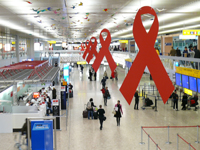
If you are one of the many travellers landing in Geneva airport this week, you will surely notice the gigantic red ribbons at the arrival and departure levels of a city that has chosen to join forces with UNAIDS and the myriad civil society organizations to draw attention to Human Rights and World AIDS Day.
A home for many international organizations, the City of Geneva is an example in its response to HIV in the community. With a rate of almost one person in a hundred living with HIV, Geneva is one of the cities most impacted by the epidemic in Switzerland. The epidemic is mainly driven by injecting drug use and same-sex sex. However, the many HIV prevention programmes in place are showing results: last year not a single new case of HIV infection due to injecting drug use was diagnosed.
Faithfull to its commitment to proactively respond to the epidemic and address the needs of those affected by it, the city, including many private sector companies, responded favourably to the call to collectively mark World AIDS Day.
I am delighted to see so many people from the International and local community coming together to show solidarity and mark this World AIDS Day and I am honoured to mark this day with you.
Jan Beagle, UNAIDS Deputy Executive Director. Management and External Relations
“We think that AIDS is an important issue for the people of Geneva and we are very happy to join with the United Nations and civil society to show our commitment to address the needs of people living with HIV, but also to sensitize the public about an epidemic that is affecting millions of people around the world,” says Rémy Pagani, Mayor of the City of Geneva.
Geneva activities are led by a World AIDS Day Committee bringing together UN staff and members of international and local organizations such as Groupe sida Genève. They were driven by the desire to share their commitment to the cause of HIV and pulled together their creativity and phone books to mobilize as many people as possible around World AIDS day.
The community came together to form a spectacular human red ribbon made up of approximately 200 people from the UN, international and local networks working on AIDS.
As a result, not only is the Airport of Geneva involved, but also red ribbons with a plaque explaining the symbol of the ribbon were placed by five key monuments around Lake Leman. World AIDS Day posters depicting human rights messages can be seen on local trams and the local hotels offered to place red ribbons and a programme of events at their reception desks.

The Ville de Genève has been a strong partner throughout, illuminating the St Pierre Cathedral and the Phare des Paquis. Local media were also very responsive, giving coverage of World AIDS Day with interviews of local and international community members to illustrate both the reality of living with HIV in Geneva and how the local authorities are responding.
A solidarity lunch was organized in the UNAIDS Secretariat Headquarters to raise funds for children affected by HIV in Cameroon. While Groupe sida Genève took the lead in organizing evening commemorative events around town to remember the friends and family lost to AIDS, but also to celebrate positive living towards a world free from stigma and discrimination.
Related

Feature Story
World AIDS Day 2009
01 December 2009
01 December 2009 01 December 2009
2009 marks the 21st anniversary of World AIDS Day. Every year, on the first of December the world comes together to commemorate those who have died and to bring attention to the global AIDS epidemic.
This year’s theme “Human Rights and Universal Access” addresses the critical need to protect human rights and ensure universal access to HIV prevention, treatment, care and support. The day is also a call to countries to remove laws that discriminate against people living with HIV, women and marginalized groups. A series of events are planned globally to mark the Day.

World AIDS Day statements
Every year UN agencies, governments and all sectors of civil society worldwide join together to campaign around specific themes related to AIDS.
Read World AIDS Day statements

International Labour Organization marks World AIDS Day
1 December 2009
About one hundred officials gathered today to form a human red ribbon to commemorate and celebrate World AIDS Day at the International Labour Organization (ILO) headquarters in Geneva on 1 December.
Read more

UNHCR chief pledges to keep AIDS response a priority
1 December 2009
As the world marked World Aids Day on Tuesday, UNHCR’s chief, António Guterres, noted that the UN Refugee Agency had expanded its global HIV and AIDS interventions. Guterres, while reiterating his personal commitment to keeping AIDS a priority for UNHCR, also stressed that his agency would continue to advocate for the abolishment of laws discriminating against those with HIV.
Read more

Michel Sidibé calls for mass prevention movement at World AIDS Day commemoration in Pretoria
1 December 2009
To mark World AIDS Day, UNAIDS Executive Director Mr Michel Sidibé joined President Jacob Zuma and South Africans in their national commemoration in Pretoria where he called for the forging of a mass prevention movement.
Read more
Read President Zuma's speech
Read Michel Sidibé's speech
Photo gallery

UN Secretary-General, Naomi Watts, Kenneth Cole, Oscar Winner Susan Sarandon and Others Highlight Human Rights at World AIDS Day “LIGHT FOR RIGHTS” Event in New York City
Commemorating World AIDS Day 2009, lights on the historic Washington Square Park Memorial Arch and other landmarks in New York City are being turned off at 6:15 pm tonight at an event to remember those lost to AIDS, and turned back on to emphasize human rights for those living with HIV/AIDS around the globe.
Read press release
Photo gallery
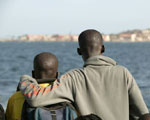
Laws that criminalize groups and behaviours threaten to jeopardize universal access to HIV prevention, treatment, care and support
On World AIDS Day, as we reflect on universal access and human rights, UNAIDS calls on governments to refrain from passing criminal laws that fuel discrimination, prevent effective national responses to HIV and violate human rights.
Read statement
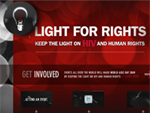
Shining light on rights this World AIDS Day in New York
To focus on the human rights of people living with HIV, United Nations Secretary-General Ban Ki-moon will be joined UNAIDS Goodwill Ambassador Naomi Watts, Kenneth Cole, chairman, board of trustees, amfAR, The Foundation for AIDS Research, New York City Speaker of the City Council Christine C. Quinn, and 13-year-old AIDS activist Keren Dunaway-Gonzalez in New York City.
Read more

Positive Health, Dignity and Prevention
Defined during a technical consultation co-organised by GNP+ and UNAIDS in April 2009, Positive Health, Dignity and Prevention is a new framework based on a human rights approach. It reinforces the leadership of people living with HIV in the design, programming, implementation, research, monitoring and evaluation of all policies and programmes that affect them. GNP+ is releasing the official report of the meeting during World AIDS Day 2009.
Read more
Download report
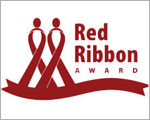
Red Ribbon Award calls for nominations to honour community leadership and action on AIDS
On this year’s World AIDS Day the UNAIDS family and the XVIII International AIDS Conference (AIDS 2010) are announcing a global call for nominations for the 2010 Red Ribbon Award. The Award honours community-based organisations for their contributions in responding to the AIDS epidemic.
Read more

Geneva celebrates positive living on World AIDS Day
1 December 2009
If you are one of the 4 million travellers landing in Geneva airport this week, you will surely notice the gigantic red ribbons at the arrival and departure levels of a city that has chosen to join forces with UNAIDS and the myriad civil society organizations to draw attention to Human Rights and World AIDS Day.
Read more
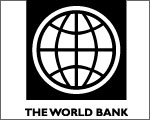
World Bank on World AIDS Day: HIV as key development issue
1 December 2009
To mark World AIDS Day this year the World Bank is hosting an event in Washington DC which brings together a wide range of international partners and high-level guests to explore key issues in the challenge to HIV. Entitled Keeping the promise, Investing in the future: Linking HIV/AIDS, food security and maternal and child health, the gathering will examine AIDS as a central development issue, forging critical links between the epidemic and broader development goals.
Read more

Taking World AIDS Day to the airwaves
To mark 2009 World AIDS Day a special amateur radio station 4U1AIDS will operate from UNAIDS Secretariat headquarters in Geneva from 1-7 December 2009 and will be broadcast all over the world via the amateur radio network. The initiative is to encourage radio amateurs all around the globe to participate in World AIDS Day.
Read more
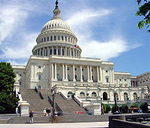
World AIDS Day to be marked by UNAIDS Office in Washington
In collaboration with twenty-six civil society organizations, the United Nations Development Programme (UNDP), the United Nations Office on Drugs and Crime (UNODC), the United Nations Population Fund (UNFPA), and the World Bank, UNAIDS is hosting a luncheon on 1 December which completes a policy forum series on HIV, human rights and key at-risk populations.
Read more

What does living with HIV mean to me?
There are an estimated 33.4 million people around the world living with HIV. As we gather around the globe this World AIDS Day to collectively commemorate, celebrate and speak out, it is important to not lose sight of the individuals behind the numbers and to remember the very real impact HIV has on people’s lives. This is Raffaele’s story.
Read more
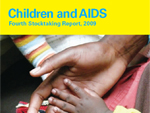
Data shows progress needed on HIV testing and treatment for children and mothers
30 November 2009
National efforts to combat AIDS, particularly by preventing mother-to-child transmission, are showing positive results, but many HIV and AIDS affected children still struggle to have their basic needs met, according to a report launched today by four United Nations agencies.
Read more
Download Report

New HIV recommendations to improve health, reduce infections and save lives
30 November 2009
On the eve of World AIDS Day, the World Health Organization (WHO) is releasing new recommendations on treatment, prevention and infant feeding in the context of HIV, based on the latest scientific evidence.
Read more

Cricketers help raise AIDS awareness
30 November 2009
On the eve of World AIDS Day, some of the world's best-known cricketers called for the international cricket community to continue to support calls for greater awareness to help continue the fight against HIV. Cricketers like Nathan Bracken, Isa Guha, Kumar Sangakkara, Graeme Smith and Virender Sehwag came together to champion the THINK WISE campaign which helps to raise awareness about HIV amongst the cricket community. All international cricketers will also wear red ribbons in matches being playes over the next few days.
Find out more
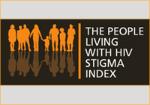
UK rollout The People Living with HIV Stigma Index
30 November 2009
An index that documents the stigma experienced by people living with HIV in the country has been launched at the Houses of Parliament, London, United Kingdom. Speakers at the launch included His Excellency Kenneth Kaunda, First President of the Republic of Zambia, Rt. Hon Andy Burnham MP; Secretary of State for Health, and Annie Lennox, singer and founder of The SING Campaign and members of the community research team.
Read more
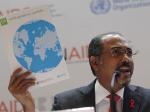
Eight-year trend shows new HIV infections down by 17%
24 November 2009
Data released by UNAIDS and the WHO highlights that beyond the peak and natural course of the epidemic HIV prevention programmes are making a difference. According to 2009 AIDS epidemic update, new HIV infections have been reduced by 17% over the past eight years.
Read more
Press release
Webcast and photos from launch press conference
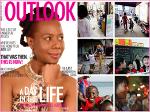
UNAIDS Outlook 2010: Fresh perspectives
24 November 2009
At the moment globally five people are becoming infected with HIV for every two people accessing treatment. It is critical that the way we respond keeps pace with and overtakes the epidemic if we are to see a real change in people’s lives, aspirations and futures. UNAIDS Outlook 2010, a new publication launched today, explores new ideas and provides fresh perspectives on the 2009 epidemiological data.
Read more
World AIDS Day 2009
UNAIDS cosponsors
UNHCR
UNFPA
WFP
UNDP
UNODC
ILO
World Bank
UNESCO
WHO
UNICEF
External links:
World AIDS Campaign
World AIDS Day events around the world
United Nations in New York




